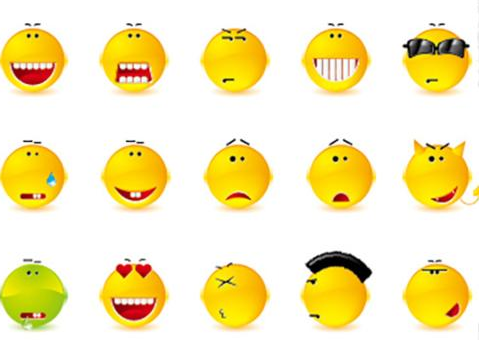(单词翻译:单击)
Should Men Use Affectionate Emojis?
男性应该使用感性的表情符号吗?
Men, you may want to think twice the next time you send a kissing face or heart-eyes emoji in a text message.
男人们,下次你在短信中发送吻脸或心心眼表情时,可能要三思了。
According to new research published in Frontiers in Psychology, the interpretation of emojis can vary drastically depending on the gender of the sender.
根据发表在《心理学前沿》杂志上的一项新研究表明,表情符号的解释可能因为发送者的性别差异会有很大的不同。
To examine gender differences in emoji interpretation, psychologists at Southwestern University recruited 80 undergraduate students to take part in a short experiment. In this study, participants were randomly assigned to one of four experimental groups.
为了研究表情符号解读中的性别差异,美国西南大学的心理学家招募了80名大学生参加一个简短的实验。 在这项研究中,参与者被随机分配到四个实验组。
They were asked to read and evaluate the contents of a text message. The text message, ostensibly sent from one coworker to another, read: "Hey Katie I'm sorry I couldn't come in yesterday. I'm feeling a lot better today though. Thanks for covering my shift."
他们被要求阅读和评估短信的内容。 这条短信表面上是一个同事发给另一个同事的,上面写着:"嘿,凯蒂,很抱歉我昨天没能来上班。 不过我今天感觉好多了。 谢谢你帮我顶班。"
While the words in the text message did not differ between groups, the researchers systematically varied the perceived gender of the text message sender (Rebecca versus Steven) as well as the emojis displayed at the end of the message (smiling face versus kissing face and heart emoji).
虽然各组的短信中的单词没有差别,但研究人员系统地改变了文本发送者(瑞贝卡&史蒂芬)的感知性别以及消息末尾显示的表情符号(微笑脸&亲亲&爱心)
In other words, participants either read the text message sent from Rebecca and ending in a smiling face, sent from Steven and ending in a smiling face, sent from Rebecca and ending in a kissing face and heart emoji, or sent from Steven and ending in a kissing face and heart emoji.
换句话说,参与者要么看的是瑞贝卡发来的以微笑脸结尾的短信,或是史蒂芬发来的以微笑脸结尾的短信,又或是瑞贝卡发来的以亲亲和爱心符号结尾的短信,和史蒂芬发来的以亲亲和爱心符号结尾的短信。
Then, researchers asked participants to evaluate the appropriateness of the text message by indicating their level of agreement with the following statements:
紧接着,研究人员通过要求参与者们表明对以下几种说法的赞同程度来评估短信的适当性
“I would send a message like this to a coworker”
"我会给同事发这样的短信"
“I find this text message acceptable”
"我觉得这条短信可以接受"
“[Rebecca/Steven] acted professionally in this case”
"瑞贝卡 / 史蒂文在这件事上表现得很专业"
“The text shows a proper tone between employees”
文字显示了雇员之间适当的语气
“This message seems inappropriate”
"这条信息似乎不太合适"
Researchers also assessed the likeability of the sender by asking participants to indicate agreement with the following four statements:
研究人员还通过询问参与者对以下说法的赞同程度来评估他们的喜好
I would like to work with someone like [Rebecca/Steven],” “I feel as though I would get along well with [Rebecca/Steven],” “[Rebecca/Steven] seems like the kind of person who gets along well with others,” and “[Rebecca/Steven] is probably a likable person.”
我想和瑞贝卡和史蒂芬这样的人一起工作,“”我觉得我会和瑞贝卡和史蒂芬相处得很好,“”瑞贝卡和史蒂芬看起来像是与其他人相处得很好的人,瑞贝卡和史蒂芬可能是非常讨人喜欢的人。“
What did they find? Interestingly, there was a stark gender difference in the way the text messages were perceived.
他们发现了什么? 有趣的是,人们对短信的感知方式存在明显的性别差异。
Consistent with gender stereotypes, texts with affectionate emojis were judged as more likable and appropriate when they were believed to have come from a woman.
与性别刻板印象相一致的是那些感性符号被认为是女人发的时,就会被看做更讨人喜欢也更合理;
Furthermore, text messages with friendly emojis (i.e., smiling faces) were judged as equally appropriate, but more likable, when they were believed to be sent by a man.
此外,带有感性表情符号的短信(比如,笑脸)被认为是由男性发送时也被看做是合适的,也更讨人喜欢。
The authors write, "Our findings confirm that people’s perceptions of a message and its sender can be affected not only by the gender of the sender but also by his or her emoji usage.
作者写道:"我们的研究结果证实,人们对信息及其发送者的看法不仅会受到发送者性别的影响,还会受到表情符号使用情况的影响。

These findings are consistent with gender stereotypes in communication (e.g., Sullins, 1992; Weisberg et al., 2011; Ling et al., 2014), showing that people generally perceive affectionately emotive women as more appropriate than affectionately emotive men."
这些发现与沟通中的性别刻板印象一致,表明人们普遍认为女性的情感丰富较之男性在情感上过度充盈显得更合理些。
What wisdom might these results hold for our everyday communications?
这些结果对我们的日常交流有什么启发呢?
Well, that depends on your gender. If you are a female, both affectionate and friendly emojis appear to be fair game, even in a work setting.
那么,这取决于你的性别。 如果你是一名女性,即使是在工作环境中,使用感性的表情符号也无伤大雅。
Men, on the other hand, might want to exercise caution when using affectionate emojis.
但另一方面,男性在使用感性表情符号时就要谨慎了。
That said, men should not shy away from using the occasional friendly emoji. After all, it may score them some likability points and, at the very least, it will help break down gender stereotypes in text message communication styles.
也就是说,男人也不必刻意回避偶尔使用表情符号。 毕竟,这会透露出一些可爱的小意味,至少可以帮助打破通信风格中的性别刻板印象。


